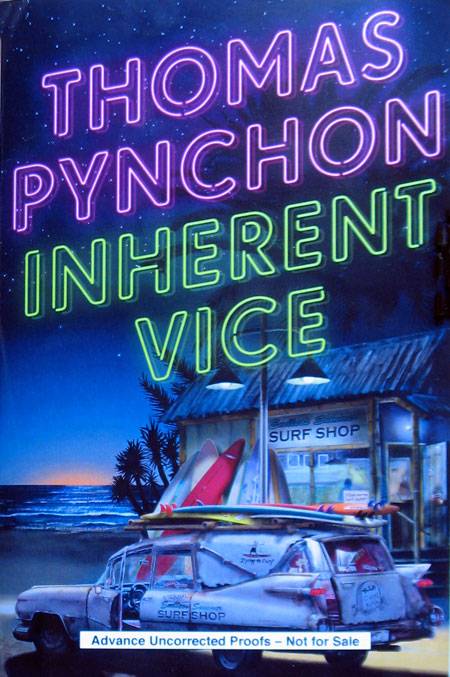 Thomas Pynchon’s new novel looks like one of those Doritos bags full of chips somehow engineered to taste like peppers or pizza or tacos. I ate taco flavor once (after three or four weeks of thinking about it, becoming more and more comfortable with the decision just to eat a bag despite the inevitable bellyache I knew would follow) and the weirdest thing about them was the uncanny taste of lettuce. The chips taste of lettuce. Later, my sister-in-law made a taco salad with plain Doritos created during an earlier moment in the history of capitalism and I suggested next time using taco flavor instead — just to square the circle.
Thomas Pynchon’s new novel looks like one of those Doritos bags full of chips somehow engineered to taste like peppers or pizza or tacos. I ate taco flavor once (after three or four weeks of thinking about it, becoming more and more comfortable with the decision just to eat a bag despite the inevitable bellyache I knew would follow) and the weirdest thing about them was the uncanny taste of lettuce. The chips taste of lettuce. Later, my sister-in-law made a taco salad with plain Doritos created during an earlier moment in the history of capitalism and I suggested next time using taco flavor instead — just to square the circle.
If Doritos can pass as tacos — lettuce and all — then Inherent Vice shows off Pynchon passing as a mystery writer. Set in the fictional Southern California town of Gordita Beach, during the NBA Playoffs and Charles Manson’s trial in 1970, Inherent Vice centers on a pot-smoking hippie private detective named Doc Sportello. Hired to find a missing real-estate developer (rumored to have been disappeared by business partners after his deciding to use his fortune to found an enormous housing complex in which anybody could live rent-free), Doc uncovers a vast conspiracy of the rentier class against the people who pay the rent. In the book’s inevitable (the mystery genre almost makes it inevitable) explanatory Scooby-Doo moment, the apparent charge of the conspiracy explains to Doc that class war is permanent and inevitable:
“We’ve been in place forever. Look around. Real estate, water rights, oil, cheap labor — all of that’s ours, it’s always been ours. And you, at the end of the day what are you? one more unit in this swarm of transients who come and go without pause here in the sunny Southland.” This is Pynchon’s version of Chinatown — or Marx.
If this view of history as a movement animated solely by class war sounds simplistic, it is. But it’s also the worldview offered in Pynchon’s enormous previous novel Against the Day, in which all of 20th century history amounts to a struggle to own light. Like Against the Day (and Mason and Dixon and all of Pynchon’s work), Inherent Vice‘s main attraction is Pynchon’s attempt to record the precise moment when the hope for one kind of future was crushed by the weight of another. In summer 1970, the hopes of the ’60s are dying, the hippie ethic of free love and community replaced by everyone else’s Charlie-Manson-fueled suspicion, Richard Nixon sits in the White House and Ronald Reagan is Governor of California, conveyed there in part by promises (later kept at the People’s Park) to try to stop the influence of hippies, commies, and radicals on the University of California. Meanwhile, Doc and the other hippies on Gordita Beach suffer constant harassment by police, the intrusions of real-estate speculators seeking to develop the beach, an influx of hippie-poseurs, and an array of other characters intent on replacing one way of life with another.
And maybe it’s in order to convey this sense of confusion that the book’s plot is so confusing. Doc follows one name to the next like Sam Spade or Philip Marlow, but his detective work leads only to a collection of facts and names that don’t explain anything at all, leaving both Doc and readers even more mystified than before. When the Scooby-Doo moment comes, the class-war explanation seems more like a joke poking fun at detective novels than a proper resolution. For example, in the course of the book, Doc discovers that the conspiracy (whose plotting animates the book) turns out to be about ten different incommensurable things and he — and we — have no idea how to decide which picture is accurate. It might be meant as Pynchon’s instruction to the reader that he simply gives up trying to make sense of it all and returns to his apartment, where late-night Godzilla movies and delivery tacos almost compensate for inevitably losing Gordita Beach to real estate developers. Inherent Vice is to mystery what taco-flavored Doritos are to tacos. Or would that be “taco-flavored Doritos are to tacos what Inherent Vice is to Pynchon’s other books”?








